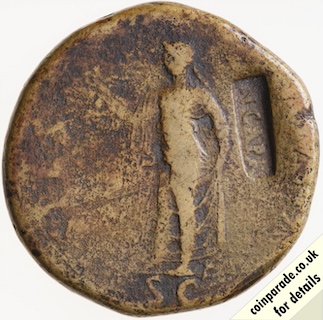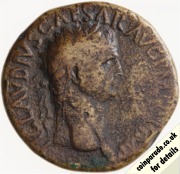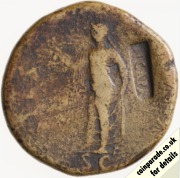
 The 41AD-54AD Sestertius - Claudius
The 41AD-54AD Sestertius - ClaudiusOrichalcum Sestertius of Emperor Tiberius N. Claudius with countermark "NCAPR". Minted between 41AD and 54AD at the Rome Mint, and could be 41AD-50AD as that is when the letter PP were thought to added to the Obverse legend. Diameter 33 mm and weighs 24.52g.
The countermark NCAPR was probably added during Nero, but may have been during Nerva. Orichalcum is a golden-coloured bronze alloy that was often used in ancient Rome coinage.
The Obverse shows the laureate head of Claudius facing right. Legend is "TI CLAVDIVS CAESAR AVG P M [TR P] IMP".
Edge is plain.
 Reverse is Spes, the goddess of hope. Spes holds a flower in a raised right hand. Legend around is "SPES [AVGVSTA]". Counter mark "NCAPR" on right. "SC" in exergue. SC means senatus consultum, or 'by decree of the Senate' so the coin was an official issue.
Reverse is Spes, the goddess of hope. Spes holds a flower in a raised right hand. Legend around is "SPES [AVGVSTA]". Counter mark "NCAPR" on right. "SC" in exergue. SC means senatus consultum, or 'by decree of the Senate' so the coin was an official issue.Image credit: Museums Victoria
Mintage: Not known
Minted at Roman Mint
More information (monarch, year, mint, country, category) can be found below coin listings.
Below are some coins currently being offered on eBay. As an eBay Partner, We may be compensated if you make a purchase.
List items on:
List items on:
Claudius (Emperor 41AD-54AD)
Classification: Roman Emperor, Roman Imperial (96-235AD)Claudius [TIBERIVS CLAVDIVS CAESAR AVGVSTVS GERMANICVS] was born on the 1 August 10BC at Lugdunum (in Roman Gaul) where his father Drusus was serving as a military legate, making him the first Emperor born outside Italy.
Claudius died on 13 October 54 AD in Rome aged 63. Many historians believed he was poisoned, maybe by his fourth wife Agrippina the Younger.
Category: Roman
The Roman Empire was one of the largest Empires in history, covering most of Europe, Britain, parts of Asia, the Middle East and North Africa. It was in existence from 27BC to 476AD, more than 500 years. And all these places used Roman coins throughout the era.Originally coins were minted only in Rome, but by the third Century there were mints in other countries too. These mints sometimes produced more than 2 million coins per month to meet demand. Coins typically depicted the Emperor on one side and some other image or letters on the other. During the Empire, more than 10,000 different types of coins were created using copper, silver and gold.
Roman coins are usually classified as:
- Roman Republican Coins (about 300BC - 27BC)
- Roman Imperial Coins (27BC - 96AD)
- Roman Imperial Coins (96AD - 235AD)
- Roman Imperial Coins (235AD - 476AD)
- Roman Provincial Coins
The Denarius was the standard Roman silver coin and there were a range of others. As a guide, in the early republic (after 211BC) there was the Sestertius (=4 denarii), Dupondius (=5), As (=10, a tenner), Semis (=20), Quincunx (=24), Triens (=30), Quadrans (=40), Uncia (=120) and Solidus (=1000, it was gold). Values fluctuated later due to debasement and inflation.
The exchange values were as follows:
1 gold aureus = 25 silver denarii
1 silver denarius = 16 copper asses
1 brass sestertius = 4 copper asses
1 brass dupondius = 2 copper assses
1 copper as = 2 copper semisses (or 4 copper quadrantes)
The standard gold coin was the Aureus and was equal to 25 denarii or 100 sestertii. It's not far off the weight of a modern gold sovereign. The Aureus was introduced by Julius Caesar around 49BC and was the principal gold coin until about the 4th century when it was replaced by the gold Solidus.
The great part of this is that you can put together a really nice Roman coin collection with very little money, as many coins (although not all) are common and inexpensive. The coins are the best part of 2000 years old and are exciting to collect.
For more information see our articles:
Which Mint: Roman Mint
The origins of the Rome mint are from the manufacture of a silver coin near to the Temple of Juno Moneta back in 269BC. Juno was the personification of money.Due to the size of the Roman Empire, Rome could not produce all the coins needed and Roman mints were set up in 27 locations, and there were more than 600 provincial mints scattered about the Empire. During overseas campaigns, Generals such as Caesar and Marc Anthony would mint their own coins to pay their armies.
Mint marks were used on the coins to differentiate the mint of manufacture.
Country of Origin: Roman Empire
The Roman Empire ran from 27BC to 476AD and was the post-Republican period of ancient Rome. It covered a large territory of Europe, Northern Africa, and Western Asia. It was ruled by an Emperor.







